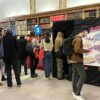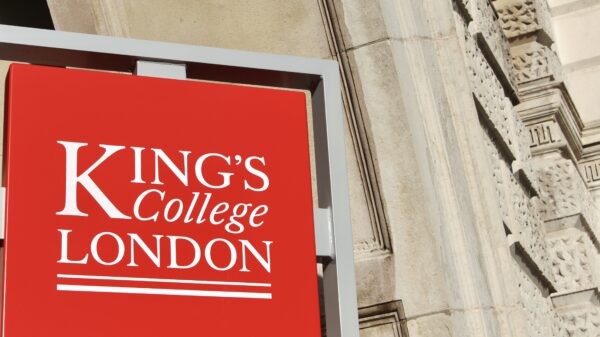Staff writer Alex Martin Astley examines how a KCL counter-terrorism course became the latest victim of the UK’s spin-fuelled culture wars.
“History stopped in 1936” – everything since has been propaganda. George Orwell made this comment looking back on his experience of the Spanish Civil War, when he realised for the first time that the truth no longer had any bearing on what was being reported in the press. With the spread of fascism that followed, he feared that lies would pass into history to eventually become truth for all but those who witnessed the war themselves.
Propaganda in our own time, though a far cry from that envisaged by Orwell in the totalitarian dystopia of 1984, is not based entirely on lies but it remains a distortion of the truth. We live in an age of spin, in which political language designed to influence us permeates almost everything we read, see, or hear in the major media outlets. A recent instance of this is very close to home. It involves our own university, a disgruntled civil servant and the mass media machine.
On Tuesday 9 January, an article was published in the little-known journal, Fathom, by a former civil servant who worked at the Foreign Office as an open-source intelligence analyst. In this article, she exposed issues of national importance that were of urgent interest to the British public. Within 24 hours, the article’s author was interviewed on a new, but increasingly popular, television channel by a famous British politician. Within a week, the story had been aired several times on similar television channels, was covered in half a dozen articles and editorials by well-established publications and had triggered an internal government review to address the issue she had exposed.
This swift reaction was proportionate – after all, the whistle-blower had exposed not only a potential threat to national security, but also the ideological subversion of entire government departments. What was the threat identified? A three-day course for civil servants taught at King’s College London (KCL).
If this account seems peculiar, or it is difficult to see how an academic course could pose such a danger to society, it is because the events have been stripped of the political language used to originally present them, distilled to their basic facts. Without the shroud of propaganda to veil them, the distortions seem obvious, if not a little crass. That is the purpose of spin, to take the facts and present them as believable narratives that are politically convenient. If we take the account above and fill in the blanks, this murky process becomes a little clearer.
The article mentioned was published by former civil servant Anna Stanley. In it, she complained about a course on the ‘Issues in Countering Terrorism’, delivered at King’s. She criticised the course for being too subjective in the way it discussed the concept of terrorism, the far-right in the UK and Israel’s actions in Palestine. She further claimed the course was biased in its handling of these subjects to the point of “indoctrination” of the civil service, and that this could amount to a “national security risk”.
All of this is reasonable enough, if Stanley did not enjoy the course, it was her right to speak out. The course, however, had received no other public complaints, was delivered by respected experts in the field and was intended to give civil servants a window in their careers to think critically about important issues such as terrorism. The question remains, how did one complaint – scant proof by any standard – ultimately cause a reaction at the highest levels of government? The answer is spin.
The journal that published the original article, Fathom, is run by the Britain Israel Communications and Research Centre (BICOM), a privately funded lobbying group that seeks to cultivate a favourable opinion of Israel in the British media and, especially, among the political elite. Stanley’s article made a point of criticising the way the course discussed the issue of Israel and Palestine, which, in her opinion, was unduly biased against Israel. In particular, she condemned any questioning of using the term “terrorist” to define Hamas – something she alleges was done when a professor commented that some people see terrorists as freedom fighters. This is the message that BICOM wanted to publicise. To shape public opinion, yes, to a degree, but mostly to influence British lawmakers in accordance with its goals.
With its rhetoric on integration and liberal bias, Stanley’s article aligned well with the agenda of the right-wing media as well. The first television channels to amplify the article were GB News and TalkTV, two opinion-based programmes whose presenters injected an already partisan account with additional buzzwords like “woke” and “illegal migration”. These terms symbolise two well-defined common enemies of the right in the UK culture wars, designed to give their particular target audience the sense that, once again, our society is on the verge of collapse. And not because of the government, whose fiscal policy has ushered in the largest drop in living standards since records began, but on account of a few liberal academics and some of the most vulnerable people in our society: refugees.
Stanley herself even questioned the accuracy of some of the more outlandish assertions made by show anchors and contributors, calling for “slightly more nuance”. From an alleged case of a single professor saying that ‘some people’ see things in a certain way, news agencies ran with headlines like ‘King’s College London Under Fire For Terming Hamas ‘Freedom Fighters’’. But that is what the culture wars are for: to divide and distract the population so that those in power can avoid being held to account.
'There was a real sense of irony to being with a load of civil servants who kind of hate the concept of the state.'
— GB News (@GBNEWS) January 10, 2024
Former civil servant, Anna Stanley, tells Nigel of the woke teachings she experienced during her counter terrorism course at King's College. pic.twitter.com/T4Ckhr7LhM
And so, the non-story became a story. This allowed the more genteel publications, The Times and The Spectator, to dedicate extensive column inches to the article by Stanley. At this stage, the story had entered the ‘elite’ or ‘agenda-setting’ media, referred to as such because their audience are closely linked to the corridors of power. These outlets altered their rhetoric accordingly, but based their reporting entirely on the initial article by Stanley, and in all cases failed to mention BICOM, the public relations group responsible for publishing and promoting the article in the first place.
In an opinion piece in The Times, Melanie Phillips used the hackneyed, clash-of-civilisations argument to rail against the “anti-western ideology infecting the public sector”. Phillips also wrote in defence of Douglas Murray, who was allegedly mentioned in the course as an example of the far-right, saying that he was accused of committing a “thought crime” for being a vocal supporter of Israel. The irony, I hope, was not lost on Phillips when using a term coined by Orwell to spread the sort of politics that he spent his lifetime fighting against.
Douglas Murray, the libertarian par excellence and defender of free speech, wrote in The Times to criticise one of the course’s lecturers, Peter Neumann, for allegedly suggesting that “far right” commentators such as Murray should be de-platformed. As with Stanley, it was Murray’s right to speak out if what was said during the course offended him. And I agree with him, cancelling is wrong. In the West, it has been used for decades as a tool by the right to silence dissidence from the left in a far more pervasive way than we are seeing today. From the McCarthy era in the US, to the suppression of the miners’ strike in the UK, the examples abound.
And yet, in a remarkably flexible twist of logic, Murray wrote in the same article that KCL should “suspend Neumann to clean up this mess”. Free speech, so it would seem, is not for those who hold an opinion contrary to Murray’s. When the right claims to defend free speech, what they are really defending is the privilege of that group to say and do as it pleases, with impunity. The rest of us had better keep quiet.
On 16 January, a week after Stanley’s article was published, the Security Minister Tom Tugendhat ordered an internal review into the way the Home Office uses external courses. A swift victory for BICOM. As mentioned, the goal of spin is to take the facts and present them as believable but inaccurate narratives to achieve a desirable political effect. In a week, BICOM had done this using little other than its connections and an article published on its journal.
The article’s content had reached hundreds of thousands of people in Britain and finally triggered a response in Westminster. The intermediaries, from GB News to The Times, got their pound of flesh too: Stanley’s article was valuable ammunition for the culture war that is polarising our society. Although, for BICOM, this is only a partial victory; a full victory in this case would mean the government cancelling external academic courses for civil servants altogether over their perceived ‘weakness’ on Israel and Hamas. This must not be allowed to happen. The most dangerous thing academia is guilty of is showing people how to think for themselves.
This case is illustrative of the way propaganda works in our country and, though we know it to be everywhere, it sometimes takes a second look to recognise the believable lies. The only successful propaganda, after all, is the one we are not aware of. To quote Orwell once more, “Political language is designed to make lies sound truthful, and to give an appearance of solidity to pure wind.”
Cases such as this are happening every day. The lobbying industry in Britain is worth billions of pounds; its companies operate beyond public scrutiny and employ thousands of professionals who spend a good deal of time thinking of clever ways to influence public opinion. Unlike “wokeness”, or academic courses, this is a genuine threat to our democracy. More transparency is needed in this sector, as well as tougher rules on political finance. We cannot change any of this overnight, but we can immunise ourselves against the barrage of partisan information by taking that second look, considering opinions other than our own, and always thinking for ourselves.
















